|
|
|


<<< Continued from previous page
The funny thing about contradictions - they dissolve if you live in a place where they can't exist. For example, it's not the hurried body who rushes to get to an appointment on time that defeats the ability to see clearly in buying situations; it's the hurried mind, forever looking ahead. If your mind isn't where you are, there's a good chance you won't be able to see what's right in front of your face. And "where you are" includes what's happening before you arrive at your destination. Who knows? If Kraus had been looking ahead at the Ritz, he might not have seen the limousine nor had the presence of mind to jump into it.
As for giving up on a buying opportunity, there comes a time in some situations where investing more effort to
make a deal happen stops making sense. In my situation, the seller, who was likely an alcoholic, was stubbornly
holding onto a fantasy about what his books were worth. And the books weren't that terrific in any case. Something
about the energy of the situation felt off, and I had to be there, not ahead of there, to see this and act upon it.
If you haven't already read it, I'd highly recommend buying or checking out a copy of Kraus's book. For one thing, there are many bookselling insights.
Example:
"I had a conviction about values and my policy has been, from the early days of my career until now, to price a book at what I believe it to be worth. If a book is worth $500 I price it at that figure, whether I paid $40 or $400. This has drawn some criticism but I consider it the only fair way. Customers want me sometimes to pass my bargains to them, to let them buy at half its value a book I acquired for quarter value. I refuse to do this. My good fortune, or lack of it, is not relevant. If I find a dollar bill on the street I do not sell it for 50 cents."
And there are snapshots of his knowledge-based approach to bookselling:
"We do not merely turn over merchandise. Every valuable book is subjected to the most rigorous examination.
Page-by-page checking is done to determine if all leaves are original, in good condition, and if any are inserted
from another copy. (An ultraviolet light is used to discover facsimiles and repairs.) We research every aspect of a
book that can be researched: the binding, any heraldic devices that may appear on bindings or bookplates, ownership
signatures, and other particulars. Never do we rely on the previous owner's description, even if he is a recognized
dealer, because it is unlikely that he has facilities for research comparable to ours or that he has such an expert
staff. Our reference library contains most of the important - and many of the less important - bibliographies and
reference works in every European language. In addition we have facilities for researching all fields of subjects
in book collecting. This is the one thing in which I take the greatest pride, that when a book has passed through
our hands it gains an unquestionable pedigree."
By the way, if you're interested in peeking at Kraus's reference library, it was sold at auction in 2003, and
Sotheby's published a gorgeous, massive catalog with exceptionally detailed descriptions and numerous color photographs,
some of Kraus interiors. Look for Sotheby's: The Celebrated Reference Library of H.P. Kraus, New York, November 18, 19 & 20, 2003.
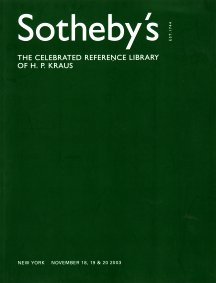
Taken in its entirety, the Autobiography is most valuable for the cumulative education one acquires in the buying
and selling of books - locating books to buy, negotiating purchases and reselling. And if I have a favorite passage,
it's the meeting that took place to examine a first edition and perfect specimen of Dante's Comedy (Foligno 1472).
Fortunately, Kraus had his wife Hanni with him that day:
"The meeting was arranged at the Hotel Neues Schloss in Zurich. The Dante seemed an excellent specimen, crisp clean leaves, wide margins, a few insignificant wormholes, and a good solid contemporary binding. I was prepared to buy. In fact we had the check written. It amounted, after some negotiation, to the equivalent of about $30,000. I collated the copy. This was an easy task. The copy was perfect.
"'Could there be some leaves in facsimile?' Hanni whispered. 'It seems to be too perfect.'"
This possibility had not occurred to me. But then I, too, had second thoughts.
At this time the deal was as good as completed. I could not ask for more time for examination. Therefore I said, "'I hope you won't object if I take a few moments to enjoy the music of the old paper? You, a publisher of music, will understand.'" The owner had no objection.
I was seated at a window and had the book on a table before me, bathed in sunlight. Gently I flipped the pages one after the other, sounding each with a sharp push of my finger; it gave the authentic old-rag paper crackle. The tune of the paper should always be the same. I was not merely delighting in the 'music,' however. I was looking for watermarks. When I found one, it carried the number 1911. Could this be a date?
"'What does this mean?'" I asked the owner, who fortunately was still the owner (we had not yet handed over the check).
"'I have no idea,'" he replied, and I believe he meant it. I had with me a copy of the Census of Incunabula in American Libraries and there, in small print, was mentioned that in 1911 a full facsimile of the Foligno Dante had been published for an exhibition in Turin, one of those exact reproductions in which even wormholes are reproduced. The 1911 binding would have given it away, but at some time it had been removed and a neat job of 'remboitage' performed, as the French call it. The book was fitted perfectly into a genuine 15th-century Italian binding and, to complete the masquerade, wormholes in the covers corresponded to those in the leaves. The owner, thinking he owned a valuable book, turned ashen. I believe he was absolutely honest. His grandfather had bought it 30 years earlier, he explained to us. Very likely he paid a great deal of money for it and was duped."
Finally, a happy discovery. As I was reading the Autobiography, I occasionally searched online for more information
on the collectors Kraus conducted business with, and often not much came up. Then I recalled that I had a copy of
Donald C. Dickinson's Dictionary of American Book Collectors (ISBN 0313225443). Fortunately, many of the collectors do
appear in this book, and their short but detailed biographies offer additional bookselling insight and provide a richer reading experience.
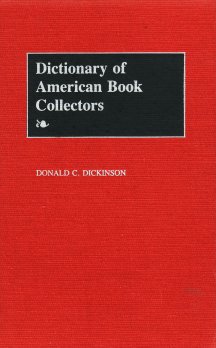
|
|

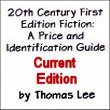

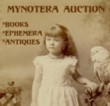

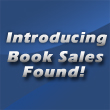
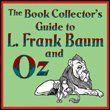

|
|












|


